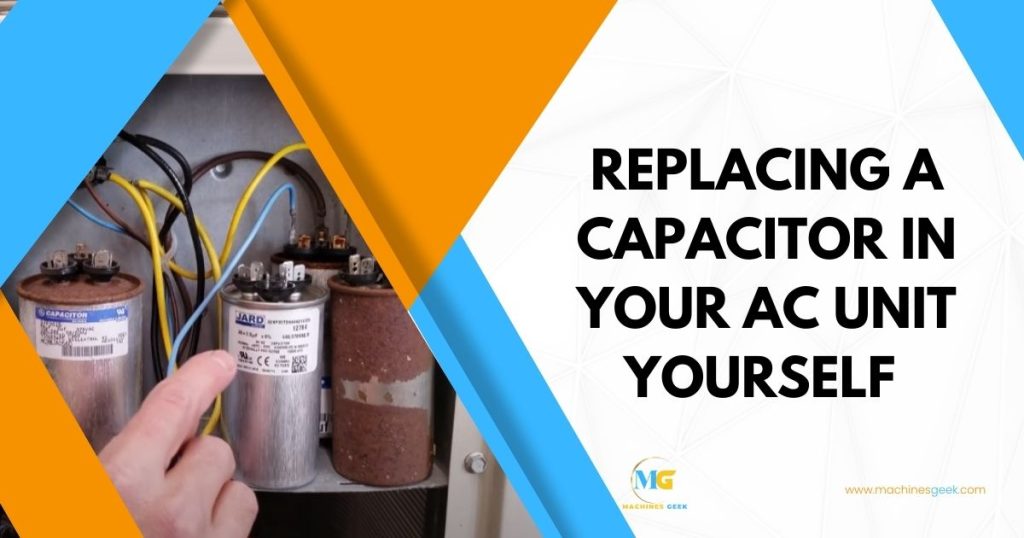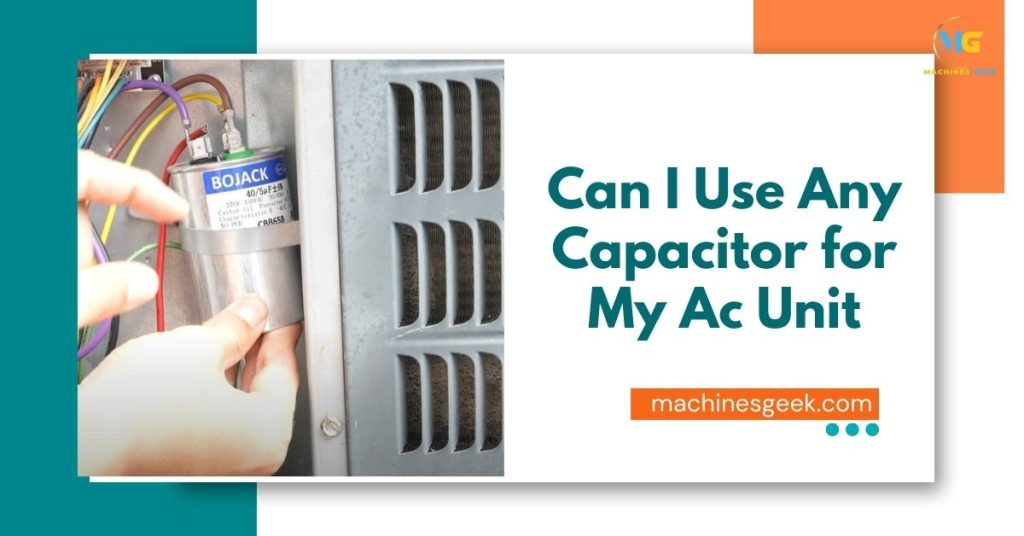Can I Use Any Capacitor for My Ac Unit? No, you cannot use any capacitor for your AC unit. The type of capacitor required for your AC unit depends on its specifications and compatibility.
An air conditioning unit is a valuable appliance, especially during the summer months. It cools the air by using a capacitor, an important component that stores and releases electrical energy. However, not all capacitors are suitable for all AC units.
Each air conditioning system has specific requirements, including voltage and microfarad ratings, which must be met for optimal performance. Therefore, it is crucial to select the correct capacitor that matches your AC unit’s specifications. We will delve into the importance of using the appropriate capacitor for your AC unit and provide essential information to help you make an informed decision.
The Importance Of Capacitors In Ac Units
Capacitors are crucial components in AC units that play a vital role in the smooth functioning of the system. They store and release electrical energy to help start and run the AC compressor.
Capacitors work by storing an electrical charge in two metal plates separated by an insulating material, which is typically made of plastic or ceramic. When the AC unit is turned on, the capacitor charges up, creating an imbalance of positive and negative charges. This stored energy is then released to assist the AC compressor in starting up and running efficiently.
The role of capacitors in AC units is particularly significant during startup. The startup capacitor provides an additional jolt of energy to help the compressor overcome inertia and begin running. Once the system is up and running, the run capacitor helps maintain a steady electrical flow, ensuring the compressor operates smoothly.
It is crucial to understand that not all capacitors are suitable for AC units. Wrong or faulty capacitors can lead to system malfunctions, including motor damage or even complete failure. It is best to consult a professional technician or refer to the manufacturer’s specifications when selecting a capacitor for your AC unit.
Factors To Consider When Choosing A Capacitor For Your Ac Unit
When choosing a capacitor for your AC unit, there are several factors to consider. First, you need to ensure that the capacitor size and voltage requirements match those of your AC unit. Different AC units have different capacitor sizes and voltage ratings, so it’s important to check your unit’s specifications before making a decision.
Additionally, you should determine whether your AC unit requires a single capacitor or a dual capacitor system. Some units require separate capacitors for the fan motor and the compressor motor, while others use a single capacitor to power both motors. It’s crucial to choose a capacitor that is compatible with your specific AC unit model to ensure proper functioning.
Remember, each AC unit has its own unique requirements, so it’s important to consult the manufacturer’s guidelines or seek advice from a professional if you’re unsure. By choosing the right capacitor for your AC unit, you can ensure optimal performance and avoid potential issues down the line.
Common Mistakes To Avoid When Choosing A Capacitor
Choosing the right capacitor for your AC unit is crucial for its optimal performance and longevity. However, there are some common mistakes that you should avoid when making this selection.
One of the most overlooked factors is matching the capacitance values of the capacitor to your AC unit’s specifications. The capacitor’s capacitance value determines its ability to store and release electrical energy. Using a capacitor with a mismatched capacitance value can result in inefficient operation and potential damage to your AC unit.
Another mistake to avoid is ignoring the voltage rating of the capacitor. The voltage rating determines the maximum voltage that the capacitor can handle. If you use a capacitor with a lower voltage rating than required by your AC unit, it may not be able to handle the electrical load and can fail prematurely.
Lastly, using incompatible capacitors can also lead to potential damage. Capacitors come in various types, such as start capacitors and run capacitors, each designed for specific functions. Using the wrong type of capacitor can disrupt the normal operation of your AC unit and even cause irreversible damage.
Tips For Selecting The Right Capacitor For Your Ac Unit
- Consult the manufacturer’s specifications or manual to identify the specific requirements for your AC unit.
- Consider seeking professional advice from an HVAC technician who can inspect your unit and provide recommendations tailored to your specific needs.
- Looking for OEM (Original Equipment Manufacturer) recommended capacitors can ensure compatibility and optimal performance.
Identifying Signs Of A Faulty Capacitor In Your Ac Unit
A faulty capacitor in your AC unit can lead to a range of issues, affecting its performance and efficiency. One sign that your capacitor may be faulty is if your AC unit is not starting or running properly. This could include the unit taking longer than usual to start up, or it may not start at all.
Another indicator is frequent tripping of circuit breakers when the AC unit is running. If you notice that your circuit breakers are frequently being tripped, it could be a sign that the capacitor is failing. Additionally, unusual noises or vibrations coming from the AC unit can also be a symptom of a faulty capacitor.
If you hear rattling, buzzing, or grinding sounds, or if you feel excessive vibrations, it is likely that the capacitor is malfunctioning. These signs necessitate immediate attention and professional repair to ensure the smooth operation and longevity of your AC unit.
Regular maintenance and inspection of the capacitor can help prevent these issues and avoid more expensive repairs in the future.
Can I Replace A Capacitor In My AC Unit Myself?

Replacing a capacitor in your AC unit yourself may seem like a straightforward task, but it’s important to prioritize safety precautions. Capacitors store electrical energy and can carry a significant charge even when the power is turned off.
To ensure your safety, always wear protective gloves and eye goggles before attempting any work on capacitors. Before touching the capacitor, use an insulated screwdriver to discharge any stored energy.
Basic steps to replace a capacitor involve identifying the faulty capacitor, removing the wires, unscrewing the old capacitor, and installing the new one. However, complex capacitor replacements often require professional intervention.
Hiring a professional not only guarantees a correct and safe replacement process but also helps identify other potential issues that might be affecting your AC unit’s performance. Whether you choose to replace a capacitor yourself or seek professional assistance, always prioritize safety.
The Consequences Of Using An Incompatible Capacitor In Your Ac Unit
Using the right capacitor is crucial for maintaining the performance and longevity of your AC unit. Using an incompatible capacitor can have serious consequences, ultimately leading to costly repairs or even the need for a completely new unit. One of the potential damages of using an incompatible capacitor is the risk of damaging the AC unit’s electrical components.
The wrong capacitor can cause these components to overheat or fail, resulting in a loss of functionality. Additionally, using the wrong capacitor can increase the risk of breakdowns and system malfunctions, leading to frequent repairs and a higher chance of your AC unit completely breaking down.
Another consequence of using an incompatible capacitor is reduced energy efficiency and increased energy consumption. The wrong capacitor can cause the AC unit to struggle to perform optimally, leading to inefficiencies in cooling and increased energy consumption. This can result in higher utility bills and a waste of energy.
Frequently Asked Questions
Can I Use Any Capacitor For My Ac Unit?
No, you cannot use any capacitor for your AC unit. Each AC unit requires a specific capacitor with the correct voltage and capacitance to function properly and prevent damage.
How Do I Choose The Right Capacitor For My Ac Unit?
To choose the right capacitor for your AC unit, check the specifications in your unit’s manual or on the old capacitor itself. Match the voltage and capacitance ratings exactly when purchasing a new capacitor.
What Happens If I Use The Wrong Capacitor For My Ac Unit?
Using the wrong capacitor for your AC unit can cause various issues such as decreased efficiency, overheating, compressor failure, or even damage to other components of the unit. It’s crucial to use the appropriate capacitor to ensure proper functioning and longevity of your AC unit.
Conclusion
To ensure optimal functioning of your AC unit, it’s crucial to choose the right capacitor. Selecting any random capacitor might not deliver the desired results. By considering factors such as voltage ratings, capacitance values, and tolerance levels, you can find the appropriate capacitor for your AC unit.
Remember, the right capacitor will contribute to the overall efficiency and performance of your AC system, enhancing its longevity and saving you from unnecessary headaches and expenses in the future. So, be vigilant and make the right choice!








